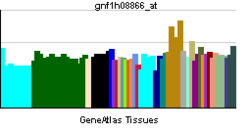KIAA1377
| CEP126 | |||||||||||||||||
|---|---|---|---|---|---|---|---|---|---|---|---|---|---|---|---|---|---|
| Identifiers | |||||||||||||||||
| Aliases | CEP126, KIAA1377, centrosomal protein 126 | ||||||||||||||||
| External IDs | MGI: 2680221 HomoloGene: 28313 GeneCards: CEP126 | ||||||||||||||||
| |||||||||||||||||
| RNA expression pattern | |||||||||||||||||
 | |||||||||||||||||
| More reference expression data | |||||||||||||||||
| Orthologs | |||||||||||||||||
| Species | Human | Mouse | |||||||||||||||
| Entrez | |||||||||||||||||
| Ensembl | |||||||||||||||||
| UniProt | |||||||||||||||||
| RefSeq (mRNA) | |||||||||||||||||
| RefSeq (protein) | |||||||||||||||||
| Location (UCSC) | Chr 11: 101.92 – 102 Mb | Chr 9: 8.08 – 8.13 Mb | |||||||||||||||
| PubMed search | [1] | [2] | |||||||||||||||
| Wikidata | |||||||||||||||||
| View/Edit Human | View/Edit Mouse |
Uncharacterized protein KIAA1377 is a protein that in humans is encoded by the KIAA1377 gene.[3][4] Also known as Cep126, the protein has been shown to localize to the centrosome. Furthermore, it is found at pericentriolar satellites and the base of the primary cilium. Depleting Cep126 leads to dispersion of pericentriolar satellites, in turn disrupting microtubule organization at the mitotic spindle.[5]
Clinical relevance
Mutations in this gene have been found to cause monomelic amyotrophy.[6]
References
- ↑ "Human PubMed Reference:".
- ↑ "Mouse PubMed Reference:".
- ↑ Nagase T, Kikuno R, Ishikawa KI, Hirosawa M, Ohara O (Apr 2000). "Prediction of the coding sequences of unidentified human genes. XVI. The complete sequences of 150 new cDNA clones from brain which code for large proteins in vitro". DNA Res. 7 (1): 65–73. doi:10.1093/dnares/7.1.65. PMID 10718198.
- ↑ "Entrez Gene: KIAA1377 KIAA1377".
- ↑ Bonavita R, Walas D, Townley AK, Luini A, Stephens DJ, Colanzi A (May 27, 2014). "Cep126 is required for pericentriolar satellite localisation to the centrosome and for primary cilium formation". Biology of the Cell. 106: 254–267. doi:10.1111/boc.201300087. PMID 24867236.
- ↑ Lim YM, Koh I, Park YM, Kim JJ, Kim DS, Kim HJ, Baik KH, Choi HY, Yang GS, Also-Rallo E, Tizzano EF, Gamez J, Park K, Yoo HW, Lee JK, Kim KK (Jan 18, 2012). "Exome sequencing identifies KIAA1377 and C5orf42 as susceptibility genes for monomelic amyotrophy.". Neuromuscular disorders : NMD. 22 (5): 394–400. doi:10.1016/j.nmd.2011.11.006. PMID 22264561.
Further reading
- Bonaldo MF, Lennon G, Soares MB (1997). "Normalization and subtraction: two approaches to facilitate gene discovery.". Genome Res. 6 (9): 791–806. doi:10.1101/gr.6.9.791. PMID 8889548.
- Wistow G, Bernstein SL, Wyatt MK, et al. (2002). "Expressed sequence tag analysis of human retina for the NEIBank Project: retbindin, an abundant, novel retinal cDNA and alternative splicing of other retina-preferred gene transcripts.". Mol. Vis. 8: 196–204. PMID 12107411.
- Strausberg RL, Feingold EA, Grouse LH, et al. (2003). "Generation and initial analysis of more than 15,000 full-length human and mouse cDNA sequences.". Proc. Natl. Acad. Sci. U.S.A. 99 (26): 16899–903. doi:10.1073/pnas.242603899. PMC 139241
 . PMID 12477932.
. PMID 12477932. - Morris JA, Kandpal G, Ma L, Austin CP (2004). "DISC1 (Disrupted-In-Schizophrenia 1) is a centrosome-associated protein that interacts with MAP1A, MIPT3, ATF4/5 and NUDEL: regulation and loss of interaction with mutation.". Hum. Mol. Genet. 12 (13): 1591–608. doi:10.1093/hmg/ddg162. PMID 12812986.
- Ota T, Suzuki Y, Nishikawa T, et al. (2004). "Complete sequencing and characterization of 21,243 full-length human cDNAs.". Nat. Genet. 36 (1): 40–5. doi:10.1038/ng1285. PMID 14702039.
- Goehler H, Lalowski M, Stelzl U, et al. (2004). "A protein interaction network links GIT1, an enhancer of huntingtin aggregation, to Huntington's disease.". Mol. Cell. 15 (6): 853–65. doi:10.1016/j.molcel.2004.09.016. PMID 15383276.
- Gerhard DS, Wagner L, Feingold EA, et al. (2004). "The status, quality, and expansion of the NIH full-length cDNA project: the Mammalian Gene Collection (MGC).". Genome Res. 14 (10B): 2121–7. doi:10.1101/gr.2596504. PMC 528928
 . PMID 15489334.
. PMID 15489334. - Stelzl U, Worm U, Lalowski M, et al. (2005). "A human protein-protein interaction network: a resource for annotating the proteome.". Cell. 122 (6): 957–68. doi:10.1016/j.cell.2005.08.029. PMID 16169070.
This article is issued from Wikipedia - version of the 6/1/2016. The text is available under the Creative Commons Attribution/Share Alike but additional terms may apply for the media files.